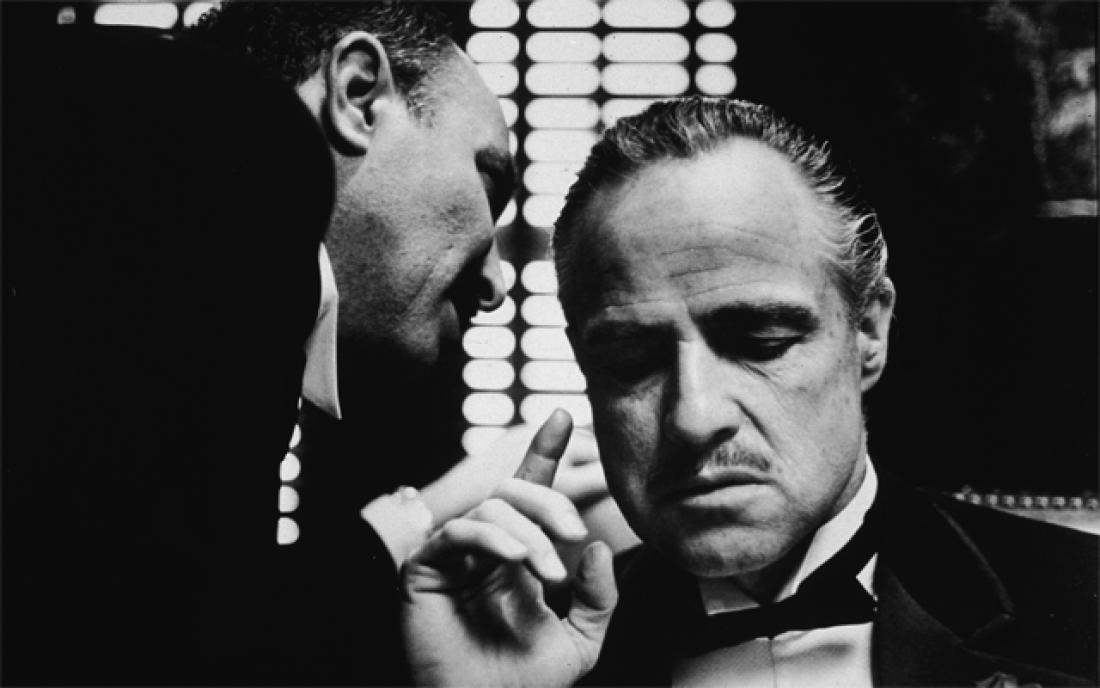A general [SPOILER ALERT] for a movie from 1972…
It’s a shame for most younger viewers, The Godfather is just a meme. I’ve been around my fair share of bad Brando impersonations (including my own) and Italian stereotypes. Too bad, because if you can get them to sit down and watch the movie, they would watch an iconic amazing film about power, influence, and the corruption of good people by the all consuming business of maintaining power.
The Godfather, or Don, in title here is Vito (Marlon Brando), head of the Corleone crime family in New York (1 of 5 families). Vito has a daughter Connie (Talia Shire) and three sons (oldest to youngest): Sonny (James Caan), Fredo (John Cazale), and Michael (Al Pacino). When Vito is attacked and sidelines by a rival family, Sonny, against the advice of consigliere Tom Hagen (Robert Duvall), engages in a street war against these families while Fredo leaves for Nevada to build the family power out there. That leaves Michael to make smart decisions to keep his father from being murdered in his wounded state. As the story goes on, it becomes clearer that Michael is the best heir to the Corleone family, and his personal ascension and moral descent grows until the transformation is complete.
The Godfather defined the 1970s era of what a movie about Italian gangs and gangsters looked like. As written and directed by Francis Ford Coppola, these families are methodical and calculated in their movements. When something awful happens, in general, reaction isn’t swift (unless you’re Sonny): it is thought out to really inflict the most harm to the enemies and to properly evaluate what harm has befallen the family. This makes all the characters smart and clever, which helps earn the stakes the movie is selling us. So when the violence happens, it’s well executed (I wonder about every godfather at a christening now), and very fast (everyone pays a toll), and VERY violent (Italians sure like animals as punch lines), which shocks and instills a fear that grasps and never leaves the audience until the movie ends.
As great as those violent action sequences are, the intrigue of the power shift in the Corleone family drives the story forward and gives the movie most of its tension. As great as Vito Corleone was, he can see his time is fading, and he becomes concerned at what is to become of his family and their influence. The Don loves his family, but he’s VERY worried about how brash and reactionary Sonny is; as the oldest, he’s the first choice to inherit the business. And then there’s Michael. Michael is a war vet with a main squeeze Kay (Diane Keaton), who loves his family but despises his business. Out of love for his dad, he dips his toes into the power struggle; the scene where he chooses to knowingly commit murder shows how he has decided to enter his hat into the power ring. As played by Al Pacino, Michael sort of rolls his eyes at the overt masculinity of it all, and then realizes he excels and loves it, and adapts to the intensity required for the role. And in his dealings with his brother and Kay, you realize through Pacino that Michael loves the power even more than the family, and that he is heretofore lost to the dark side of the Force.
Pacino and Brando are the stars here, but the supporting cast is also excellent. James Caan gives Sonny the right note of a man driven by emotion instead of thought. He dials it back until he needs to jack it up to a 10. When he makes a mistake, you feel all the pain and anger Sonny feels because he doesn’t understand why he’s being called out. Robert Duvall is a great opposite to Caan. Stoic and regal, Duvall carries Tom Hagen as if he could have been the Don were it not for an unfortunate heritage constraint. John Cazale (lost too soon) as Fredo pays off much more in the 2nd film, but you can see the foundations of the complicated relationship he and Michael have as a result of Michael’s ascension. The women get the short shrift here, but Talia Shire and Diane Keaton give the outsider perspective to non-alpha males to the horrors of a world they experience only from afar. Abe Vigoda, Gianni Russo, Richard Castellano, Al Letteri, Alex Rocco, and Simonetta Stefanelli all turn in great supporting performances in limited roles, with many like Vigoda becoming household names thanks to this film.
The Godfather represents the passing of the acting and directing torch from one era to another. Francis Ford Coppola became a directing force, dragging along buddies of his named Spielberg and Lucas onto the scene with him. Marlon Brando gave a great swansong performance, and passed the torch to Al Pacino, who dominated prestige cinema for two decades thanks to his starring role here. So kids, look past all the joking impressions of Pacino, and remember, there’s a reason all these amazing people have a Pacino impression to begin with.

